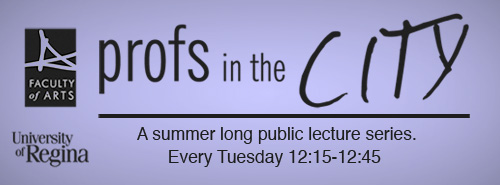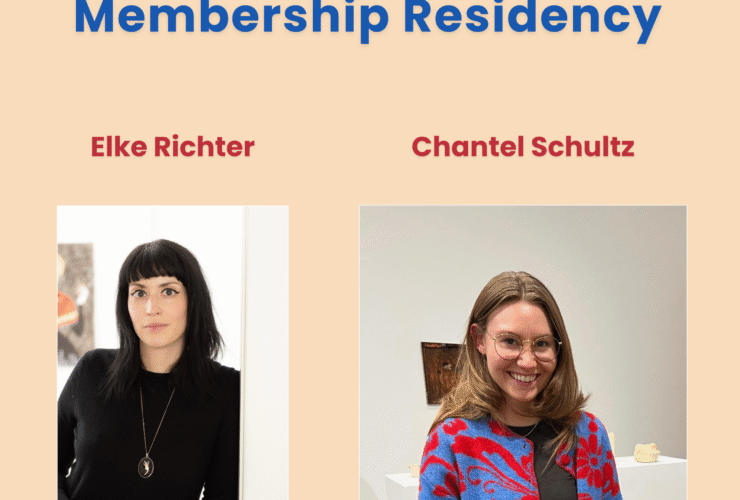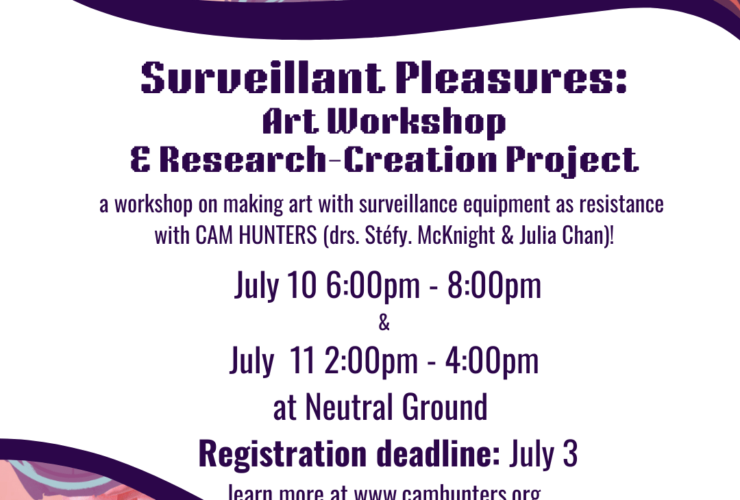Profs in the City
A program created by the University of Regina Centre for Continuing Education and the Faculty of Arts.
A summer long public lecture series: Profs in the City. Installments of the series will take place Tuesdays over the lunch hour and will feature University of Regina professors, students and community partners delivering interactive and fun public talks.
Date: Tuesdays, June 7 to August 30 (with the exception of June 28 and July 19)
Time: 12:15 pm – 12:45 pm
Place: Neutral Ground Contemporary Art Forum (1856 Scarth St., Regina, on the second floor)
FULL EVENT SCHEDULE
Tuesday June 14, 12:15 pm – 12:45 pm
‘Solidarity with Palestine: The Case for Boycotts, Divestment and Sanctions Against Israel’, by Emily Eaton (Geography)
Eaton looks at the tactics used by the growing international movement for solidarity with Palestine including cultural, consumer and academic boycotts. She measures the extent to which such boycotts have been effective, paying particular attention to the Canadian context. She also offers the opportunity to think about the ways in which local communities in Regina can productively engage with this movement.
Tuesday June 21, 12:15 pm – 12:45 pm
‘North Central Portraits’, by Philip Charrier (History)
Charrier speaks about his North Central Portraits, which began as a project about landscape and evolved into one about citizenship. His interest in the architecture and history of North Central gradually became a desire to interact creatively with people there, and in so doing quietly protest the existence of a line that divides the community of Regina. He speaks about the way making photographs provided him with a ‘task’ in North Central, a way of becoming accepted in a place where he neither lives or works. The portraits, which Charrier feels belong as much to the residents of North Central as they do to him, have been exhibited at the North Central Community Association office over the last year, and some have appeared in the community newspaper. Their beauty, he feels, derives not only from the natural dignity of the people they depict, but as evidence of contact, of co-operation, and of respect across the line.
Tuesday July 5, 12:15 pm – 12:45 pm
‘Muslim Canadian Citizenship: Champions and Challengers’, by Brenda Anderson (Women’s and Gender Studies/Religious Studies, Luther College)
Moving beyond the predictable stereotypes of Islam as an ‘alien’ culture intent on overrunning Canadian values, Anderson will take up the question of what Muslim values have to offer to Canadian visions and goals. Canada has historically met immigrants with some suspicion, yet history also shows that we have an ability to weave diversity into our country’s fabric.
Tuesday July 12, 12:15pm – 12:45 pm
‘Current Trends in Policing’, by Rick Ruddell (Justice Studies)
The way that policing is carried out is shifting as a result of changing social, demographic, and economic conditions, according to Ruddell. Not only are the police expected to respond to a growing number of threats, such as gangs, high-risk offenders, and organized crime, but they are increasingly asked to do more with fewer resources. His presentation addresses a number of future trends in policing as they relate to Saskatchewan, including Aboriginal and community policing, the use of technology, police-social system partnerships, specialized units, human resource management, as well as potential threats and opportunities (including changes in crime trends).
Tuesday July 26, 12:1pm – 12:45 pm
‘Conservation psychology, Environment, Well-being, and Food’, by Katherine Arbuthnott (Psychology, Campion College) and Psychology students Aja Burton, Dan Devoe, Connie Heidt, Morgan Labrash, Gabe Roy-Wright, Sarah Sangster, Caz Sebastian, & Nikolina Vracar
What does psychology have to do with the environment, Arbuthnott and her students ask? The answer is: behaviour. Human activities contribute to many of our most pressing environmental problems. Interestingly, research shows an association between pro-environmental behaviour and personal well-being. Students of the Psychology 340 class will share their research with Regina citizens showing connections between environmental attitudes, well-being, and stress. They will also discuss how food choices and cooking habits can contribute to both our own health and that of the environment.
Tuesday August 2, 12:15 pm – 12:45 pm
‘Literature, Psychology, and Environmental Action?’, by Katherine Arbuthnott (Psychology, Campion College) and Kathleen Wall (English)
Environmental issues such as climate change, food and water shortages are beginning to touch us all, say Arbuthnott and Wall. The academic response is to find ways to use our knowledge to help deal with these issues. Literary scholars have developed ‘ecocriticism’, the analysis of ecological values evident in writing, and psychologists have developed ‘conservation psychology’, the study of behaviour related to the natural environment. The goal of both of these areas is to help find solutions for our environmental problems. Given this common goal, Arbuthnott and Wall have joined forces to see if certain types of literature can more effectively help us change our behaviour.
Tuesday August 9, 12:15 pm – 12:45 pm
‘The “Land Grab” Comes Home: New Forms of Corporate Investment in Prairie Agriculture’, by Andre Magnan (Sociology)
Rural sociologists have long puzzled over the fate of the ‘family farm’ in advanced, capitalist economies. Magnan explains that agriculture is one of the few economic sectors still mostly made up of small, independent economic actors – family farmers. Traditionally, corporate interests have shied away from directly investing in food production because of the inherent risks of farming. What then, asks Magnan, explains the recent surge in corporate investment in prairie farmland and farm production? He will explore this issue by highlighting the case of One Earth Farms, a corporate mega-farm, and new prairie farmland investment trusts.
Tuesday August 16, 12:15 pm – 12:45 pm
‘The Creative Process’, by Kathleen Wall (English)
According to Wall, writers, if they’re to come out of their world and touch the reader’s, must be curious; indeed curiosity is part of the creative process. She explains how in working on her second novel, Soul Weather, which is about being at home in our lives, our skins, and on the planet, she had to use that curiosity to learn many things. The students in her writing classes, she explains, have generously taught her much about being young at this historical moment. She says she eavesdrops in coffee shops, just like you. Because one of her characters is a young women who has just finished and MFA in ceramics, she had to learn to throw pots. Though she calls herself a terrible potter, Wall says she now understands the pleasure of clay taking shape under your fingers.
Tuesday August 23, 12:15pm – 12:45 pm
‘Rapunzel Untangled: Should Walt Disney be Allowed to Mess with our Beloved Traditional Fairy Tales?’, by Nicholas Ruddick (English)
Since Snow White and the Seven Dwarfs in 1937, explains Ruddick, Walt Disney Studios have produced popular animated film versions of well-known traditional fairy tales. Disney’s fiftieth and latest is Tangled (2010), a full-length adaptation of the tale in the Grimm Brothers’ collection known as ‘Rapunzel’, about a long-haired beauty who lives in a tower. Ruddick asks: does Disney respect the beloved fairy tales he adapts, or are his movies part of a vast cynical merchandising operation to squeeze as much cash as possible out of naive parents and their young children?
Tuesday August 30, 12:15 pm – 12:45 pm
‘Gardening with Native Plants’, by Fidji Gendron (First Nations University of Canada) and Sarah Vinge
Gendron and Vinge will explain how people can obtain native Saskatchewan species, and how to design, prepare and maintain a native plant garden.


